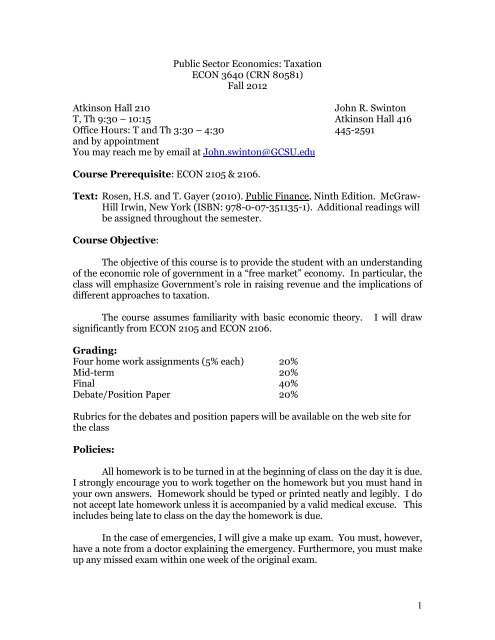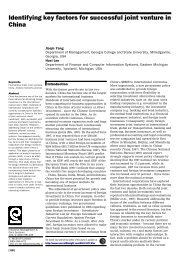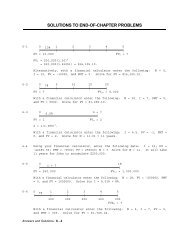Syllabus - GCSU Faculty Web Server
Syllabus - GCSU Faculty Web Server
Syllabus - GCSU Faculty Web Server
You also want an ePaper? Increase the reach of your titles
YUMPU automatically turns print PDFs into web optimized ePapers that Google loves.
Public Sector Economics: Taxation<br />
ECON 3640 (CRN 80581)<br />
Fall 2012<br />
Atkinson Hall 210<br />
John R. Swinton<br />
T, Th 9:30 – 10:15 Atkinson Hall 416<br />
Office Hours: T and Th 3:30 – 4:30 445-2591<br />
and by appointment<br />
You may reach me by email at John.swinton@<strong>GCSU</strong>.edu<br />
Course Prerequisite: ECON 2105 & 2106.<br />
Text: Rosen, H.S. and T. Gayer (2010). Public Finance, Ninth Edition. McGraw-<br />
Hill Irwin, New York (ISBN: 978-0-07-351135-1). Additional readings will<br />
be assigned throughout the semester.<br />
Course Objective:<br />
The objective of this course is to provide the student with an understanding<br />
of the economic role of government in a “free market” economy. In particular, the<br />
class will emphasize Government’s role in raising revenue and the implications of<br />
different approaches to taxation.<br />
The course assumes familiarity with basic economic theory.<br />
significantly from ECON 2105 and ECON 2106.<br />
I will draw<br />
Grading:<br />
Four home work assignments (5% each) 20%<br />
Mid-term 20%<br />
Final 40%<br />
Debate/Position Paper 20%<br />
Rubrics for the debates and position papers will be available on the web site for<br />
the class<br />
Policies:<br />
All homework is to be turned in at the beginning of class on the day it is due.<br />
I strongly encourage you to work together on the homework but you must hand in<br />
your own answers. Homework should be typed or printed neatly and legibly. I do<br />
not accept late homework unless it is accompanied by a valid medical excuse. This<br />
includes being late to class on the day the homework is due.<br />
In the case of emergencies, I will give a make up exam. You must, however,<br />
have a note from a doctor explaining the emergency. Furthermore, you must make<br />
up any missed exam within one week of the original exam.<br />
1
Finally, this class is meant to be an opportunity for you to apply the<br />
economic ideas you have developed over the past few years of your education.<br />
Feel free to ask questions that are tangential to the topics being discussed. I will<br />
be happy to entertain relevant diversions. I will, however, moderate any<br />
discussion that strays too far from the course material and I will insist on civility<br />
in the discussion.<br />
Required Statements that must be attached to Course <strong>Syllabus</strong>:<br />
Religious Observance Policy<br />
Students are permitted to miss class in observance of religious<br />
holidays and other activities observed by a religious group of which the<br />
student is a member without academic penalty. Exercising of one’s<br />
rights under this policy is subject to the GC Honor Code. Students who<br />
miss class in observance of a religious holiday or event are required to<br />
make up the coursework missed as a result from the absence. The<br />
nature of the make-up assignments and the deadline for completion of<br />
such assignments are at the sole discretion of the instructor. Failure to<br />
follow the prescribed procedures voids all student rights under this<br />
policy.<br />
Assistance for Student Needs Related to Disability<br />
If you have a disability as described by the Americans with Disabilities<br />
Act (ADA) and the Rehabilitation Act of 1973, Section 504, you may be<br />
eligible to receive accommodations to assist in programmatic and<br />
physical accessibility. Disability Services, a unit of the <strong>GCSU</strong> Office of<br />
Institutional Equity and Diversity, can assist you in formulating a<br />
reasonable accommodation plan and in providing support in developing<br />
appropriate accommodations to ensure equal access to all <strong>GCSU</strong><br />
programs and facilities. Course requirements will not be waived, but<br />
accommodations may assist you in meeting the requirements. For<br />
documentation requirements and for additional information, we<br />
recommend that you contact Disability Services located in Maxwell<br />
Student Union at 478-445-5931 or 478-445-4233.<br />
Student Opinion Surveys statement<br />
Given the technological sophistication of Georgia College students, the<br />
student opinion survey is being delivered through an online process.<br />
Your constructive feedback plays an indispensable role in shaping<br />
quality education at Georgia College. All responses are completely<br />
confidential and your name is not stored with your responses in any<br />
way. In addition, instructors will not see any results of the opinion<br />
survey until after final grades are submitted to the University. An<br />
invitation to complete the online opinion survey is distributed to<br />
students near the end of the semester. Your participation in this very<br />
important process is greatly appreciated.<br />
2
Academic Honesty<br />
The integrity of students and their written and oral work is a critical<br />
component of the academic process. The submission of another’s<br />
work as one’s own is plagiarism and will be dealt with using the<br />
procedures outlined in the GC Catalog. Remember that allowing<br />
another student to copy one’s own work violates standards of<br />
academic integrity.<br />
Fire Drills<br />
Fire drills will be conducted annually. In the event of a fire alarm,<br />
students will exit the building in a quick and orderly manner through<br />
the nearest hallway exit. Learn the floor plan and exits of the building.<br />
Do not use elevators. If you encounter heavy smoke, crawl on the<br />
floor so as to gain fresh air. Assist disabled persons and others if<br />
possible without endangering your own life. Assemble for a head count<br />
on the front lawn of main campus or other designated assembly area.<br />
Class Attendance Policy<br />
Although it is recognized that absences will sometimes be necessary,<br />
students are expected to attend classes regularly. It is the<br />
responsibility of students to be cognizant of their own record of<br />
absences and to consult the instructor regarding work missed. The<br />
decision to permit students to make up work rests with the instructor.<br />
At any time during the semester an instructor has the right to assign a<br />
grade of F for excessive absences when a student exceeds the number<br />
of allowable absences specified in the instructor’s attendance policy<br />
distributed to the student in the instructor’s course syllabus. If a<br />
student is representing the University in an official capacity, as verified<br />
on a list released from the Office of the Provost, the instructor will not<br />
penalize the student for those absences. However, students should<br />
consult their instructor before anticipated absences.<br />
Students who wish to have their instructors notified of a medical or<br />
family emergency necessitating their absence from classes, or who<br />
wish to provide documentation in support of a request for excused<br />
absences, make-up work, or grades of "W" or "I" due to an<br />
emergency, may contact the Office of the Vice President for Student<br />
Affairs. The Student Affairs staff will inform students about procedures,<br />
assist with communication to instructors, receive and file<br />
documentation, and advise students regarding their own selfadvocacy;<br />
however, the final determination of excused absences,<br />
make-up classwork, and grading is determined by the instructor.<br />
Approved University Senate, 2010<br />
3
Course Outline:<br />
Note: I will assign additional readings during the course. In many cases the<br />
readings will be posted on my web site. If I cannot obtain a .pdf file of the<br />
readings I will provide you with a hard copy.<br />
August 14 – 16<br />
Introduction<br />
Chapters 1, 2, and 3<br />
August 21 – 28<br />
Taxation and Income Distribution<br />
Chapter 14<br />
Homework 1 due August 28<br />
August 30 – September 4<br />
Efficiency Cost of Taxation: Chapter 15<br />
September 6 – 11<br />
Equity and Optimality: Chapter 16<br />
September 13 – 20<br />
Personal Income Tax: Chapter 17<br />
Homework 2 due September 13<br />
September 25 – October 2<br />
Response to Income Taxation: Chapter 18<br />
Homework 3 due October 2<br />
Midterm: October 4<br />
October 11 – 16<br />
Corporate and Capital Taxation: Chapter 19<br />
October 18 – 23<br />
Deficit Financing: Chapter 20<br />
October 25 – November 1<br />
Tax Reform: Chapter 21<br />
Homework 4 due October 30<br />
Class Debates:<br />
November 6 – 20<br />
You will be assigned a proposition (likely not of your choosing) that you must<br />
defend. I will grade you on your ability to marshal literature to your defense. I<br />
will also expect you to identify existing arguments against your position and<br />
refute them. Topics to be announced in class<br />
4
The first draft of your Position Paper due Day of your scheduled debate. I will<br />
review if and provide suggestions. It is required that you turn in your draft at<br />
that time. It must have citations to be considered acceptable.<br />
November 27: Pulling it all together and tying up loose ends<br />
Final: In class on November 29.<br />
Final Position Paper Due Friday December 7:<br />
Your paper will be based on your assigned debate topic. The paper will be 5-8<br />
pages in length (not including title page or citations), 11 point font, doublespaced.<br />
It will have no fewer than 5 correctly written citations from peerreviewed<br />
economic journals.<br />
5










